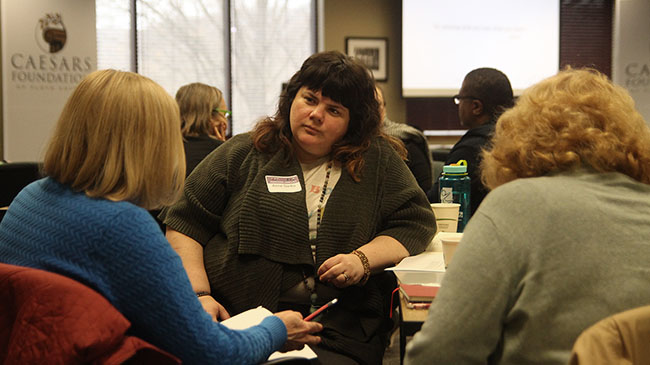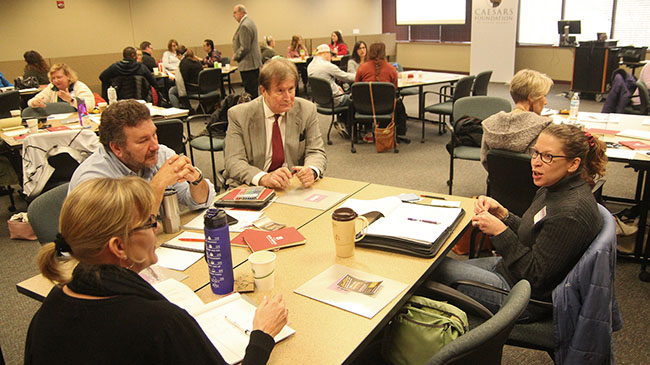By Steven Krolak
(NEW ALBANY, Ind.)–Conflict is inevitable.
But it can actually be a positive thing if we learn to deal with it correctly.
Likewise, negative behaviors such as bullying, harassment and violence are learned, and can be prevented, corrected and reversed with proper training and tools.
This was the theme of the one-day workshop, Resolving Conflict: An Introduction to Building Harmonious Relationships and Civil Dialogue, a free event made possible by a grant from the Caesar’s Foundation of Floyd County.
The workshop was facilitated by Dr. John-Robert Curtin and Tony Belak, founders of the 4Civility Institute, a not-for-profit organization based in Louisville, Kentucky, that provides training, software systems, restorative justice and Behavioral Transition/Transformation Practice solutions to schools, businesses and organizations.
Dr. Curtin is also an adjunct Instructor of criminology and criminal justice at IU Southeast.
Participating were IU Southeast students, staff and faculty, as well as community members from across Kentuckiana.
Whether leaders, team-members, teachers or learners, all brought a vested interest in improving interpersonal dynamics to an event that provided food for thought as well as tools for best practices.
The event was initiated by Dr. Kelly Ryan, dean of Social Sciences at IU Southeast. Ryan enlisted support both on and off campus for a dialogue she believes is urgently needed.
“Compromise and consensus are at the heart of our civic and governmental institutions in the United States, and yet civil discourse has been difficult to achieve,” Ryan said.
In a series of challenging and revelatory exercises, Curtin and Belak challenged participants to become empathetic and self-aware in their dealings with colleagues, family and friends.
The exercises covered the full range of human communication, from spoken words to body language, illuminating commonly perceived habits with insights from psychology and neuroscience.
Participants learned key ways to resolve disputes and acquired knowledge about listening and perception that can transform communication, including understanding one’s own and others’ perceptions, responding constructively to challenges, forgiving, deconstructing drama triangles and facilitating productive group discussions. Shot poems were among some of the activities that provided opportunities for reflection and self-evaluation.

In one exercise, participants in groups of three were given prompts to reveal something personal. One member of the group received an additional prompt: to act distracted during the others’ story. For the speaker: hurt, anger and sense of disrespect. For the distractor: remorse, shame but sometimes a sense of power from the act of passive bullying.
The sharing and discussion that followed illuminated some basic principles about the importance–psychological as well as emotional–of listening for both partners in a conversation. At stake is more than cognition, but trust and human connection.

In another demonstration, Curtin demonstrated a plastic “hedgehog”–a manipulative that had spines when closed but lost them when opened, illustrating the effect of compassion on communication.
For IU Southeast students, the workshop was helpful in drawing attention to critical aspects of their profession.
Kayden Nichter, a senior from Oldham County, Kentucky majoring in nursing, the exercises in awareness aligned perfectly with the needs of her field.
“As a nurse, you have to be able to communicate with doctors, families and managers,” Nichter said. “You have to practice active listening to fully understand what patients are going through, what they want to communicate, in order to improve their health.”
Ryan noted that the Association of American Colleges and Universities (AASCU) has ranked the development of skills in civil dialogue among the most important objectives of higher education institutions.
That role takes on added significance when preparing students to succeed in a world in which nearly 40 percent of a manager’s daily activities are consumed to dealing with interpersonal conflict.
“Having a regard for the feelings and expressions of our friends and family is important to building trust, even when we may disagree with those expressions,” Ryan said. “Learning to build shared conversations about topics among our friends and family generates those skills for future use at work and in civic dialogues.”
Homepage Photo: A workshop participant handles the “hedgehog,” a manipulative that loses its “spikes” when it opens up, illustrating the importance of compassion and understanding in communication.


